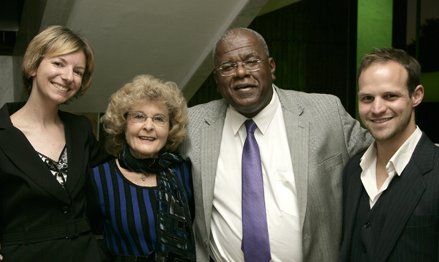Latest News Archive
Please select Category, Year, and then Month to display items
31 December 2019
|
Story Dr Cindé Greyling
|
Photo Anja Aucamp
 Dr Mariana Erasmus, SAENSE Platform Manager, says water remediation is vital for both the ecosystem and industries.
Dr Mariana Erasmus, SAENSE Platform Manager, says water remediation is vital for both the ecosystem and industries.
KovsieInnovation at the UFS supports innovative research outputs in various ways – one of which is to protect the intellectual property and to register patents where viable. This is in line with KovsieInnovation’s broader aim to create third-stream income for the university. Patent registration is a complex process and the UFS is proud to have the needed expertise to properly facilitate such an endeavour.
The SAENSE Platform
South Africa is a water-scarce country, with many water hungry industries (such as agriculture and mining). “Industrial processes often contaminate water with heavy metals, harmful chemicals, radioactive waste, and even organic sludge,” Dr Mariana Erasmus, SAENSE Platform Manager, explains.
Hence, water remediation is vital for both the ecosystem and industries. One of the key functions of the SAENSE Platform is to offer water-remedial solutions for the (bio)remediation of nitrates, heavy metals, and salts, among others. The platform’s activities and services are supported by undergraduate and postgraduate students and researchers, using Technology Innovation Agency (TIA) funding. TIA is a national public entity that serves as key institutional intervention to bridge the innovation chasm between research and development.
From waste to water
Through the joint effort of two mining companies and the UFS/TIA SAENSE Research Platform, a new treatment for mine drainage (MD) has been developed. This patented B-DAS (Barium – Dispersed Alkaline Substrate) technology effectively treats the major contaminants found in acid, alkaline, or neutral mining wastewater. The aim of the B-DAS system is to provide a passive water-treatment solution with minimum waste production; it can also be a potential pre-treatment for reverse osmosis (RO) to lower the requirements of the membranes and therefore potentially reduce the RO cost.
The success of the patent is that it turns unusable water into water that is fit for agricultural purposes at a reduced cost and increased efficiency.
'England, the English and the problem of education in South Africa.’
2013-09-26
|
 |
Attending the lecture were, from the left: Dr Susan Brokensha, Senior Lecturer: Department of English; Prof Rosemary Gray, Professor Emeritus (Honorary Life Vice-President of the English Academy of Southern Africa); Prof Jonathan Jansen; and Dr Thinus Conradie, Lecturer: Department of English.
Photo: Johan Roux
26 September 2013 |
Prof Jonathan Jansen: Lecture
The university celebrated the life of one of South Africa's most renowned art critics, hosting the 2013 English Academy’s Percy Baneshik Memorial Lecture on the Bloemfontein Campus.
The keynote lecture was delivered by Prof Jonathan Jansen, Vice-Chancellor and Rector, who joined a distinguished list of speakers to have delivered the lecture. Presented annually by the English Academy of Southern Africa, an association dedicated to promoting the effective use of English as a dynamic language in Southern Africa, past speakers include Prof Es’kia Mphahlele, Prof Njabulo Ndebele, Dr Alan Paton and Prof Albie Sachs. The lecture is hosted at venues across the country and this year Bloemfontein paid tribute to Percy Baneshik.
In his speech Not even colonial born: England, the English and the problem of education in South Africa,' Prof Jansen addressed the dilemma of the politics of language in both school and university education today.
Talking about the dominance of English in schools, Prof Jansen said it is the language of choice because indigenous languages are so poorly taught. "Simply learning in your mother tongue is absolutely no guarantee of improved learning gains in school. The problem is not the language of instruction; it is the quality of teaching, the knowledge of curriculum and the stability of the school."
Prof Jansen told the audience in the CR Swart Hall that Afrikaans-exclusive, or even Afrikaans-dominant white schools represent a serious threat to race relations in South Africa. "You simply cannot prepare young people for dealing with the scars of our violent past without creating optimal opportunities in the educational environment for living and learning together."